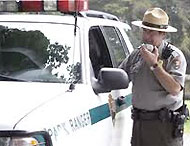Article from: www.thenewspaper.com/news/42/4231.asp
10/11/2013
Federal Court Allows Park Rangers To Make Arrests Outside Parks
US Court of Appeals for the First Circuit allows the National Park Service to arrest motorists outside federal property.
 The National Park Service has threatened to arrest visitors to monuments and national parks during the partial government shutdown that began October 1. On the last day before the shutdown took effect, the US Court of Appeals clarified that rangers can also arrest motorists outside of any national park or monument, even though they lack statutory authorization to do so.
The National Park Service has threatened to arrest visitors to monuments and national parks during the partial government shutdown that began October 1. On the last day before the shutdown took effect, the US Court of Appeals clarified that rangers can also arrest motorists outside of any national park or monument, even though they lack statutory authorization to do so.
A three-judge panel of the First Circuit upheld the August 31, 2007 arrest of Kevin Ryan, who was convicted of driving under the influence of alcohol (DUI) outside the Charlestown Navy Yard, which is part of the Boston National Historic Park in Massachusetts. Park Ranger David LeMere saw Ryan's vehicle cross the center line while it was still in the park, so he followed. By the time the ranger activated his patrol car lights, they were no longer on federal property.
Ryan refused to take a breathalyzer test, so he was booked on three federal charges related to DUI. Ryan argued that a park ranger had no jurisdiction to make such an arrest outside his jurisdiction. A magistrate judge and a district court judge each agreed Ranger LaMere lacked jurisdiction, but they declined to suppress the evidence against Ryan. The Court of Appeals upheld their decision.
The court applied the reasoning of a 2008 US Supreme Court decision, Virginia v. Moore, which held that the Fourth Amendment did not require excluding evidence when police illegally arrested a motorist for driving on a suspended license, which is not an arrestable offense in Virginia. The appellate court noted that the case here involved federal law and the power of arrest, not the type of offense committed.
"Neither distinction provides a reason to suppress the evidence against Ryan," Judge Jeffrey R. Howard wrote for the court. "Although much of the discussion in Moore focused on issues specific to state law, the court repeatedly stated that an arrest supported by probable cause is constitutionally reasonable, without implying an exception for an arrest in violation of a federal statute... As to the territorial limit on LaMere's jurisdiction, Moore again implies that an extraterritorial arrest is not a per se violation of the Fourth Amendment."
The Supreme Court noted that the Fourth Amendment was intended to protect against searches and seizures conducted in an extraordinary manner that are harmful to privacy or physically threatening.
"For an officer to arrest an obviously intoxicated driver just outside that officer's territorial jurisdiction, after a lawful traffic stop, is not remotely akin to the invasions of privacy that might call for the exclusion of evidence," Judge Howard concluded.
A copy of the decision is available in a 25k PDF file at the source link below.
Source: US v. Ryan (US Court of Appeals, First Circuit, 9/30/2013)
Permanent Link for this item
Return to Front Page
 The National Park Service has threatened to arrest visitors to monuments and national parks during the partial government shutdown that began October 1. On the last day before the shutdown took effect, the US Court of Appeals clarified that rangers can also arrest motorists outside of any national park or monument, even though they lack statutory authorization to do so.
The National Park Service has threatened to arrest visitors to monuments and national parks during the partial government shutdown that began October 1. On the last day before the shutdown took effect, the US Court of Appeals clarified that rangers can also arrest motorists outside of any national park or monument, even though they lack statutory authorization to do so.